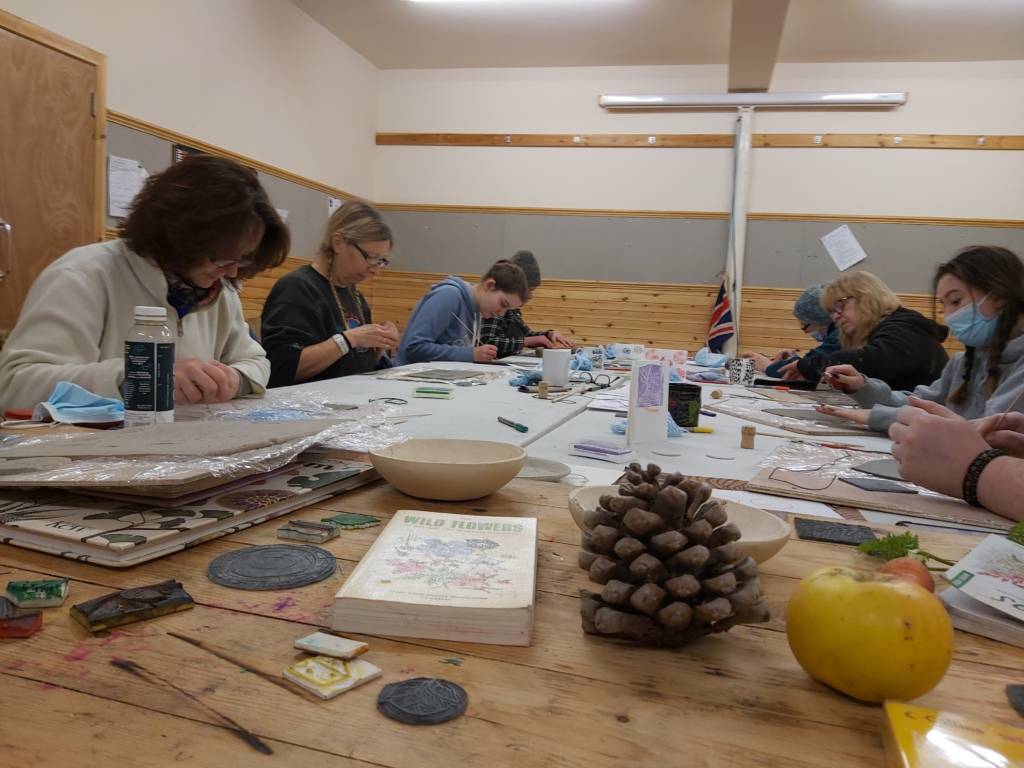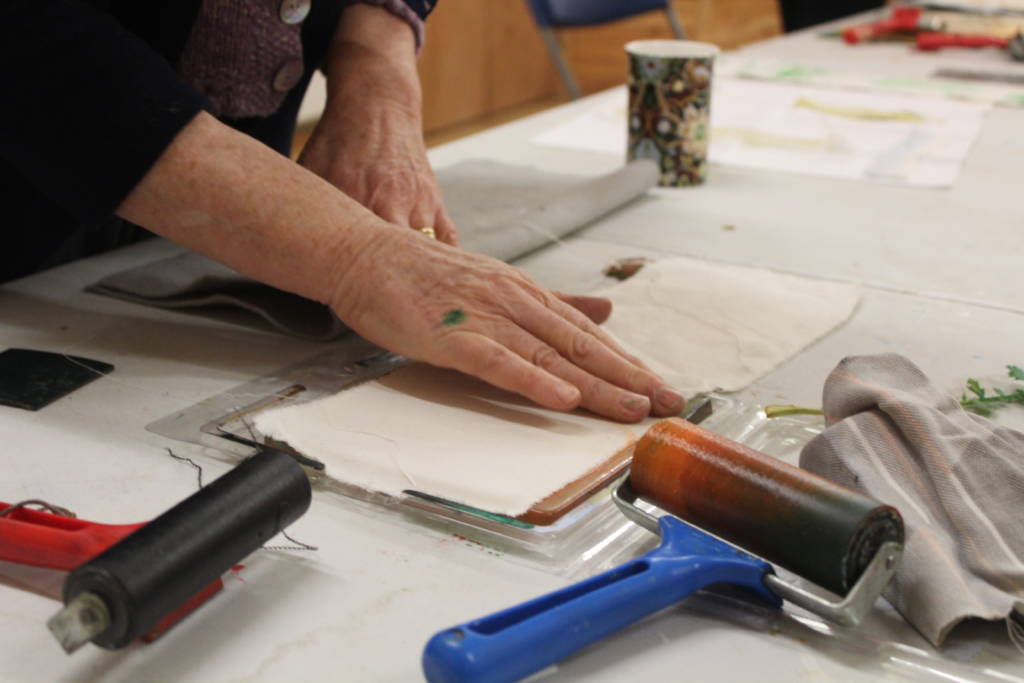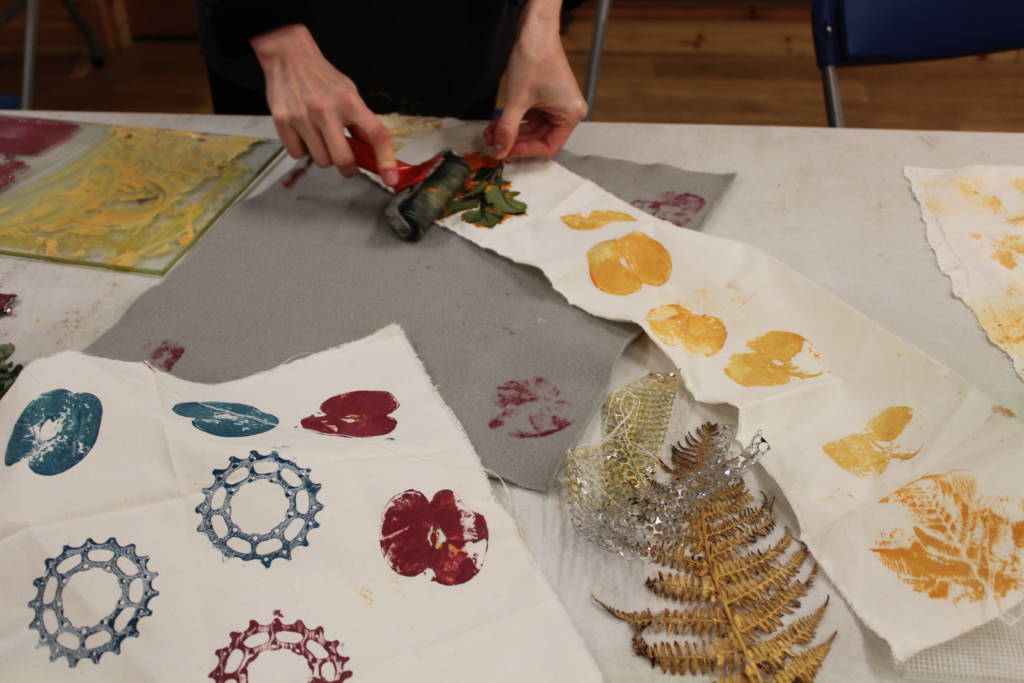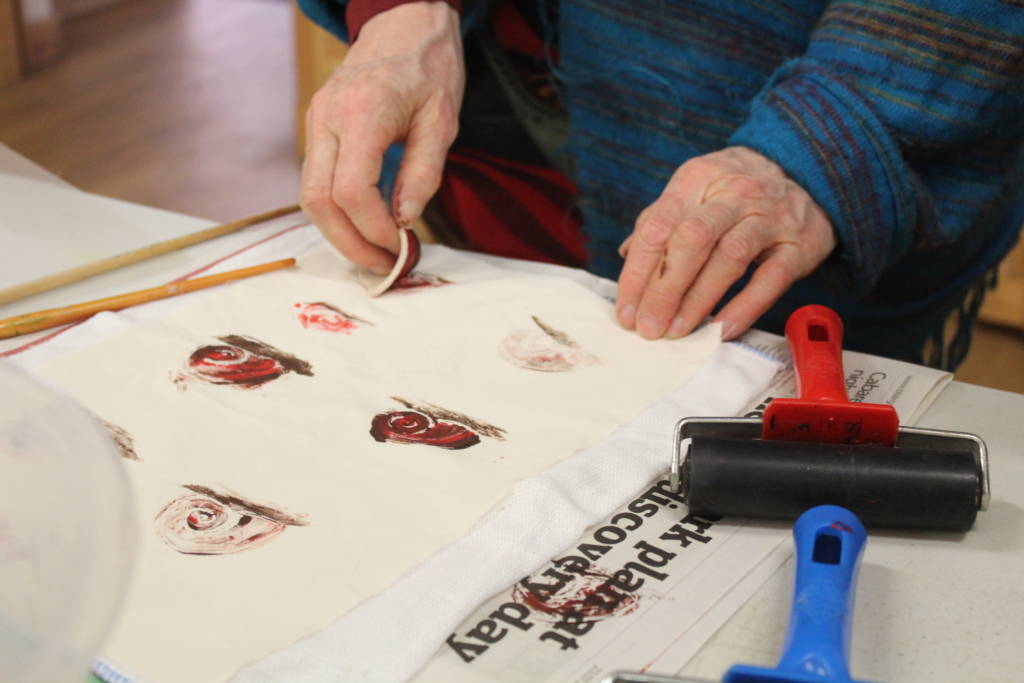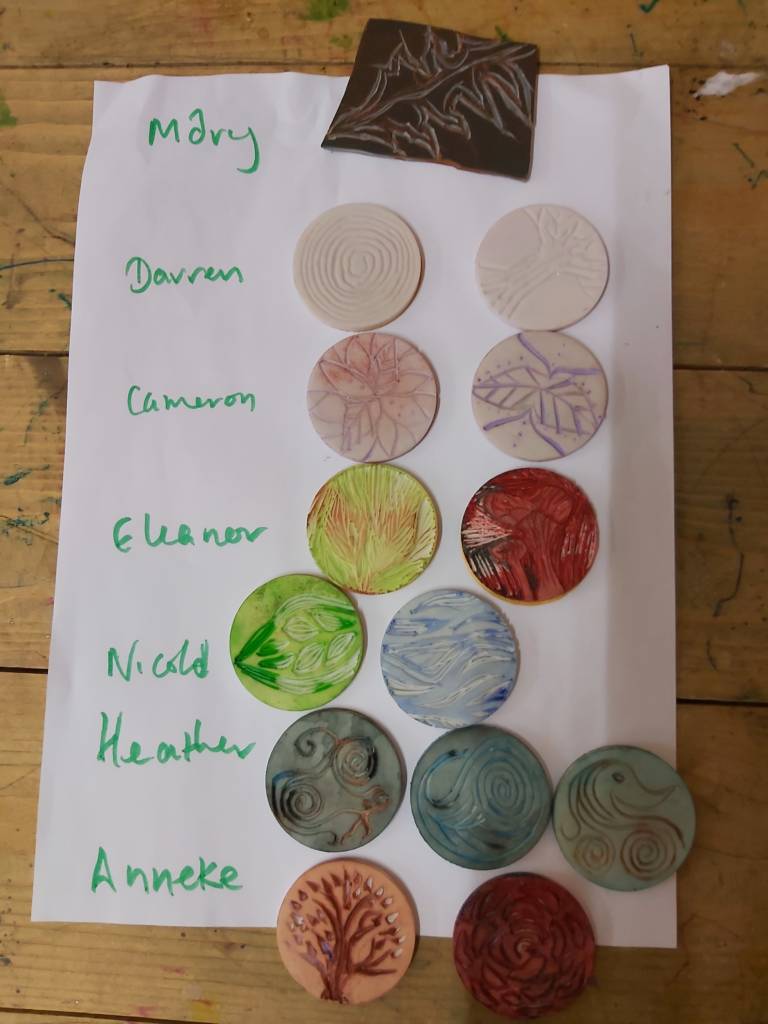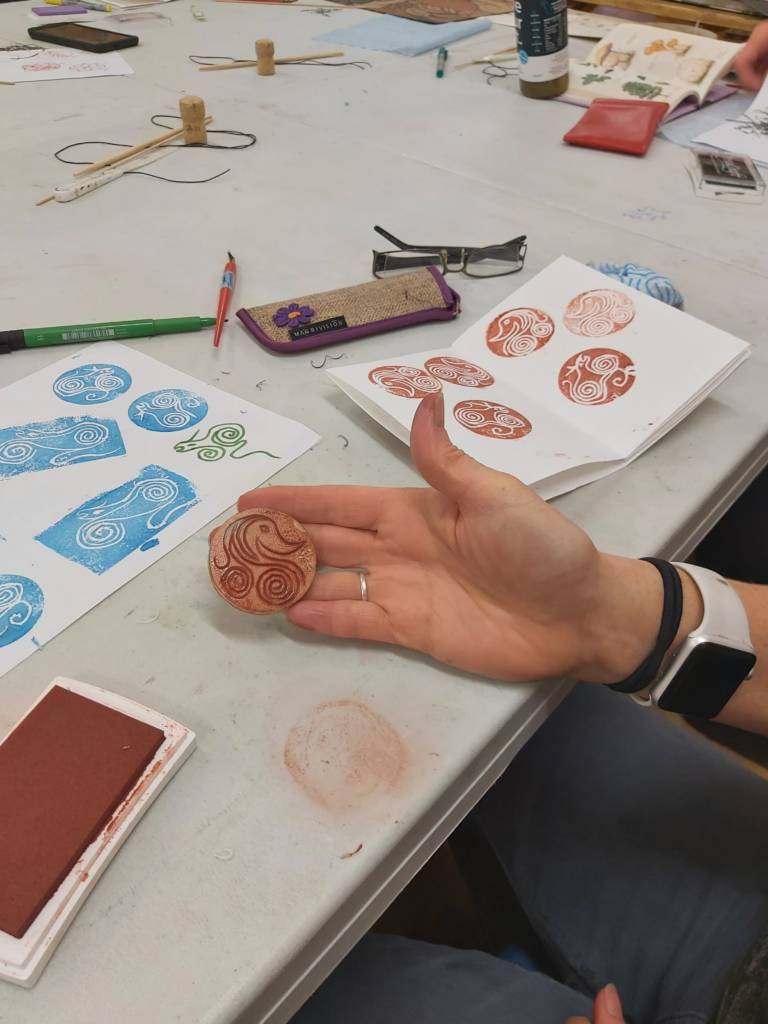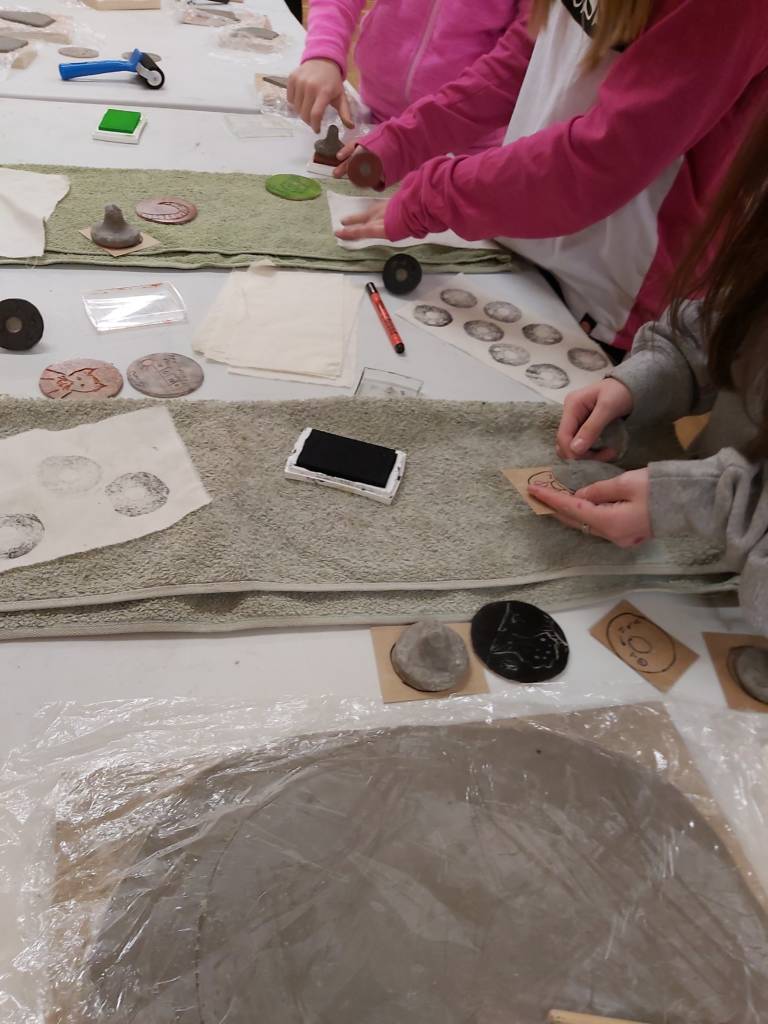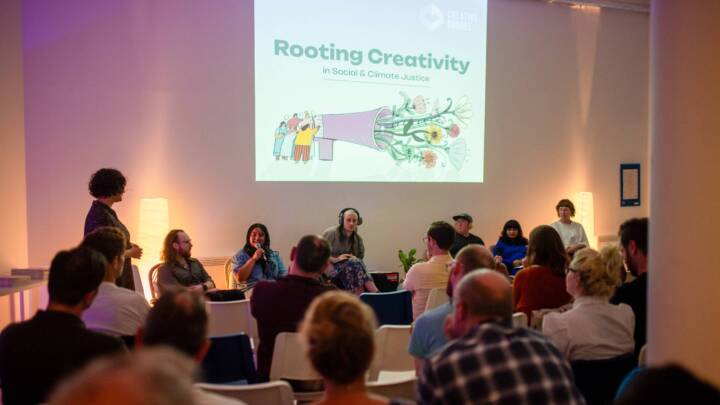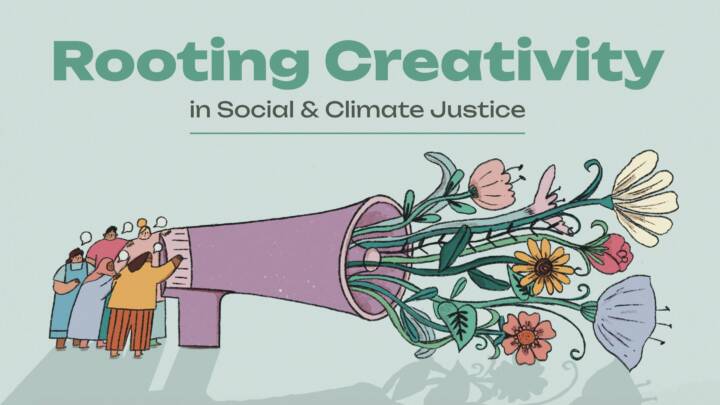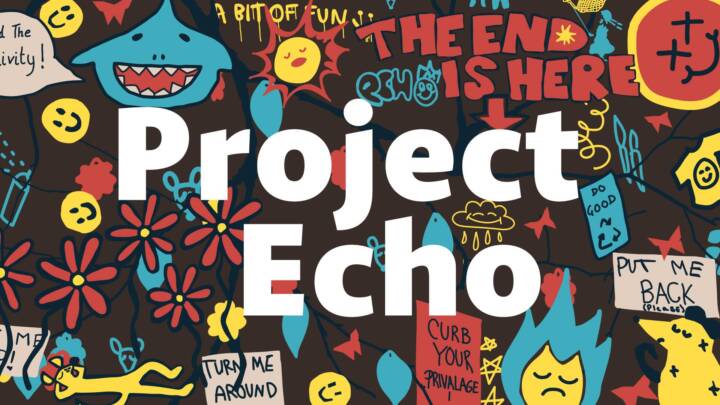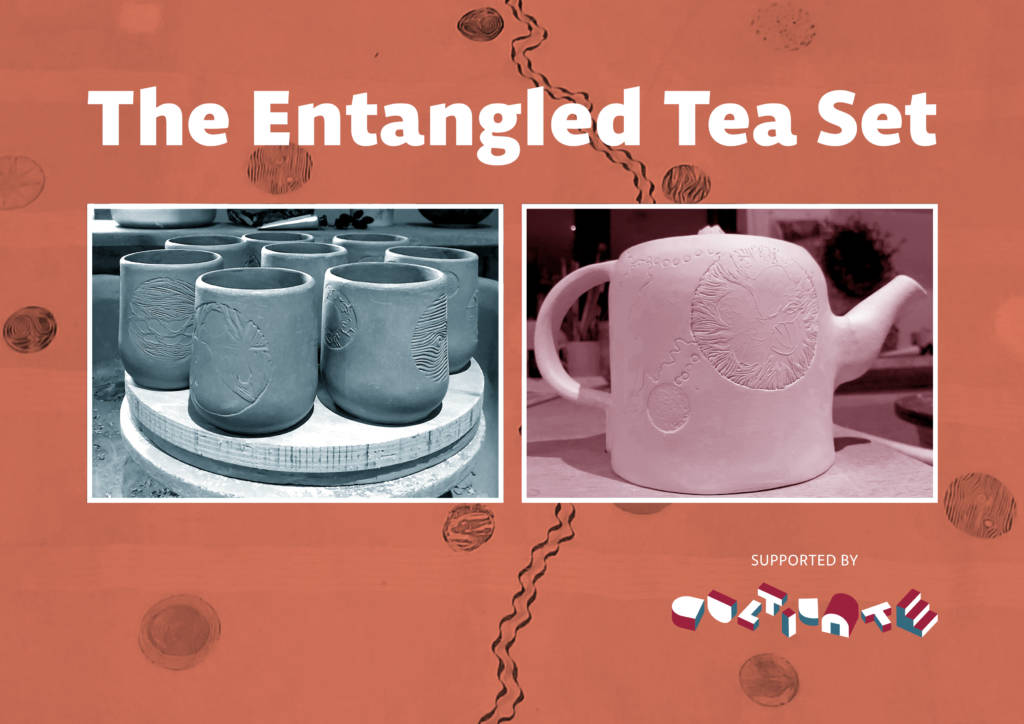
In this CULTIVATE Case Study, we share Creative Practitioner Nicky Bolland’s collaboration with the Cateran Ecomuseum and Alyth Development Trust in Perth & Kinross.
CULTIVATE is a regional leadership programme for Creative Practitioners and local communities to collaboratively explore new ways of embedding creativity at the core of grassroots collective action for climate justice, across the Tay region.
We introduced the programme and its participants in summer 2021, detailing each collaboration and the ambitions of the Creative Practitioners and Community Partners taking part. We also shared a mid-project reflection in February 2022, sharing some of the highlights and challenges we’ve experienced whist working on this pilot initiative.
This case study collates the work of Creative Practitioner Nicky Bolland and her Community Partners, the Cateran Ecomuseum and Alyth Development Trust. Both organisations are located in Perth & Kinross—with the Cateran Ecomuseum being situated on the 500-million-year-old Highland Boundary Fault, the great geological feature that divides the Scottish Highlands from the Lowlands. These case studies act as an archive for each CULTIVATE collaboration, aiming to share the learnings of each participant, demonstrate the impacts of individual projects, and provide concrete examples of the benefits of working with creative practitioners on community-led projects.
Project
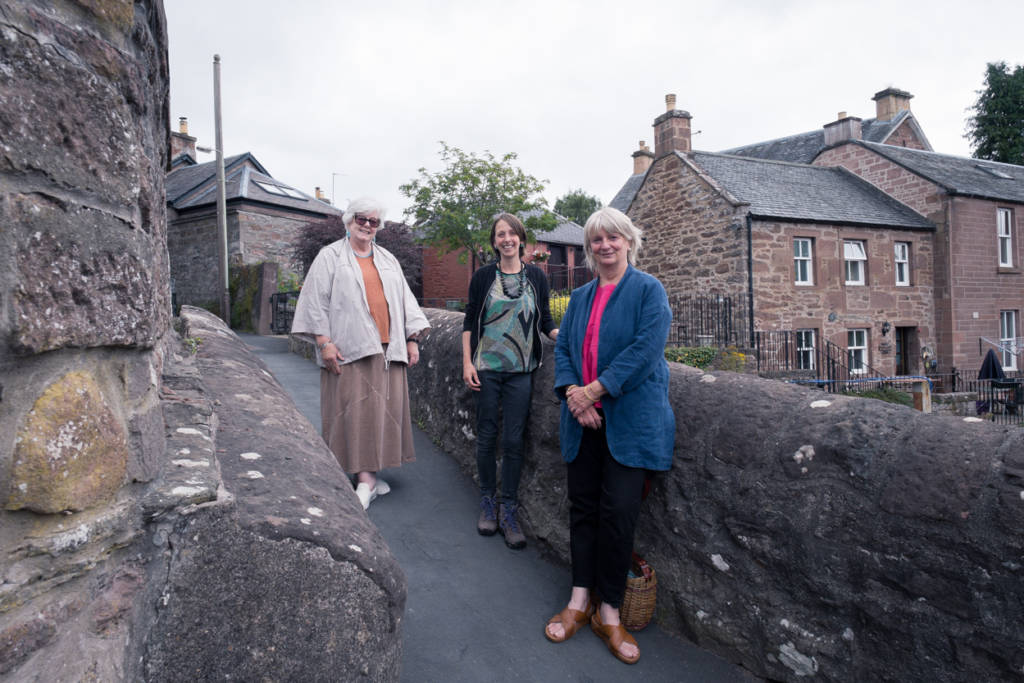
Creative Practitioner: Nicky Bolland
Nicky Bolland is a visual-artist, maker and community worker from Caputh. She nurtures her growing personal practice in ceramics and print-making whilst continuing to develop her community arts practice. This occurs alongside her roles as a mother to two young children and a community worker with a small charity, Support Choices. Nicky has worked with communities across Scotland and internationally on a wide range of issues and using different creative methods. She enjoys building relationships, growing ideas and exploring big questions.
Community Partners: the Cateran Ecomuseum and Alyth Development Trust
The Cateran Ecomuseum and Alyth Development Trust have joined forces to launch Scotland’s first Museum of Rapid Transition, aimed at harnessing people’s experience of natural and cultural heritage to mobilise rapid climate action and transition to more sustainable ways of living, and to show local people and visitors how the story of our past can help guide the story of our future.
Project ambitions:
Clare Cooper, co-director of the Cateran Ecomuseum, said, “We want to use visualisation of how the natural world of this part of Scotland has undergone continuous change for millions of years, to generate a collective imagination from the people of Alyth who will cast the timeline forward from the present to depict what the future of both its human and biotic communities could be if regenerative actions were taken.”
Nicky said, “I think of Alyth as a place with strong community networks where interesting things happen, but I know it is also a place where the climate crisis is already felt—in the form of regular flooding, exacerbating the existing challenges that so many small rural communities face. There is often an active tension in rural communities between what has come before and what might lie ahead. I see this project as an opportunity to meaningfully address these tensions, through compassionate dialogue, taking the heritage of Alyth as the springboard for co-creating a different future.”
Process
Half-way into their commissions, CULTIVATE’s Creative Practitioners, were invited to share their journeys so far; you can read Nicky’s reflections in her mid-project blog.
Nicky shared her experience of meaningful time spent with the Alyth community, building on the strong networks that already exist while using creativity and play to imagine the future with people in a place where the climate crisis is already acutely felt.
Through community activities, Nicky sought to ensure that anyone could join the conversations about the climate crisis that she was instigating. She tailored a range of activities and questions to ask in order to connect with individuals and groups in ways that resonate with them, making note of what worked well and what didn’t. These activities included encouraging people to create and build things using materials available to hand, playing games, and fostering spaces to make things together—with the understanding that asking people directly to share experiences and ideas can be difficult and daunting, whereas—when people are working alongside each other—conversation can feel less intimidating, more natural, and more insightful.
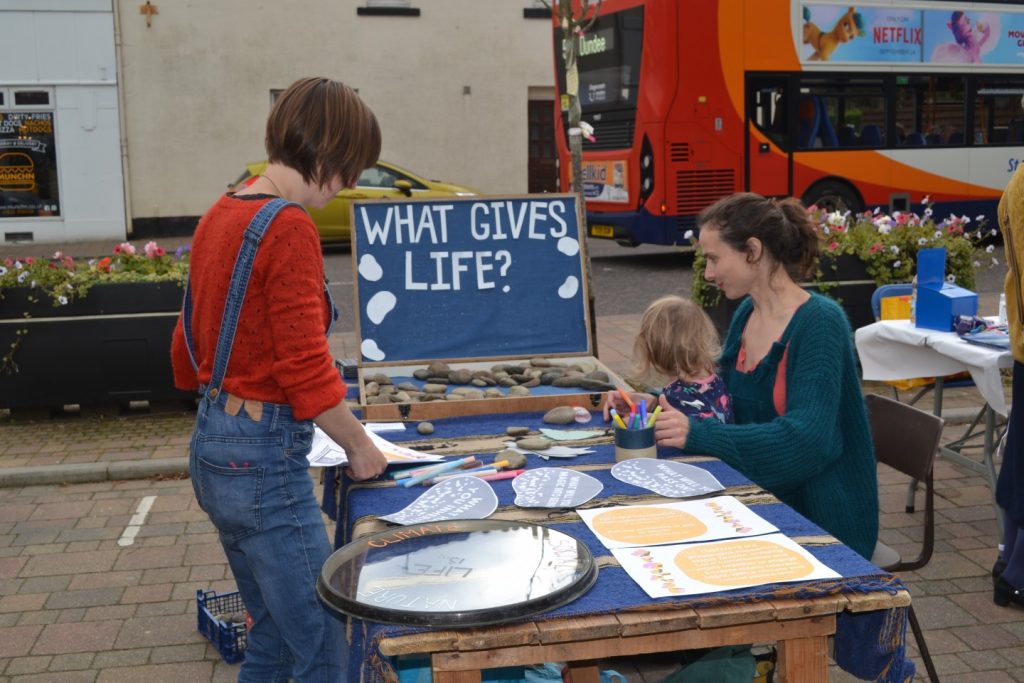
Nicky was also frank about challenges experienced in relation to her project. Local flooding led to a community exhibition being postponed, and she was aware of a heightened need for sensitivity when instigating conversations within a community experiencing negative climate-related impacts. Burnout and maintaining momentum are struggles familiar to many creative practitioners and community workers; she also found sourcing materials for a project centred around the climate crisis and climate justice a time-consuming and sometimes difficult venture, but ultimately one that was worthwhile and influential on her personal practice and life.
By planting seeds through activities and chats with the community, ideas for the next phase of her project started to sprout. These included exploring creating a resource library at the local youth hub, more workshops for hosting discussion and making together, and a community tea set that could become a central tool for continued conversation.
Leading on from this, Nicky led several mark-making workshops with various groups where they explored printing on textile and clay. They created designs inspired by drawings by participants and found items from nature that they were invited to bring.
Outcomes
The Entangled Tea Set
Drawing on Alyth’s rich past and present and its vision of the future, community members contributed to the creation of a tea set. The Entangled Tea Set can be used as both a ceremonial and everyday resource for the community.
The tea set has been designed to be not only something the community has contributed to creating, but to feel like something they can use whenever they’d like to use it. Crafted to be portable and transported to wherever it’s needed (whether indoors or outdoors), it can instigate opportunities to come together and act as an anchor in discussions about the things that matter to the community.
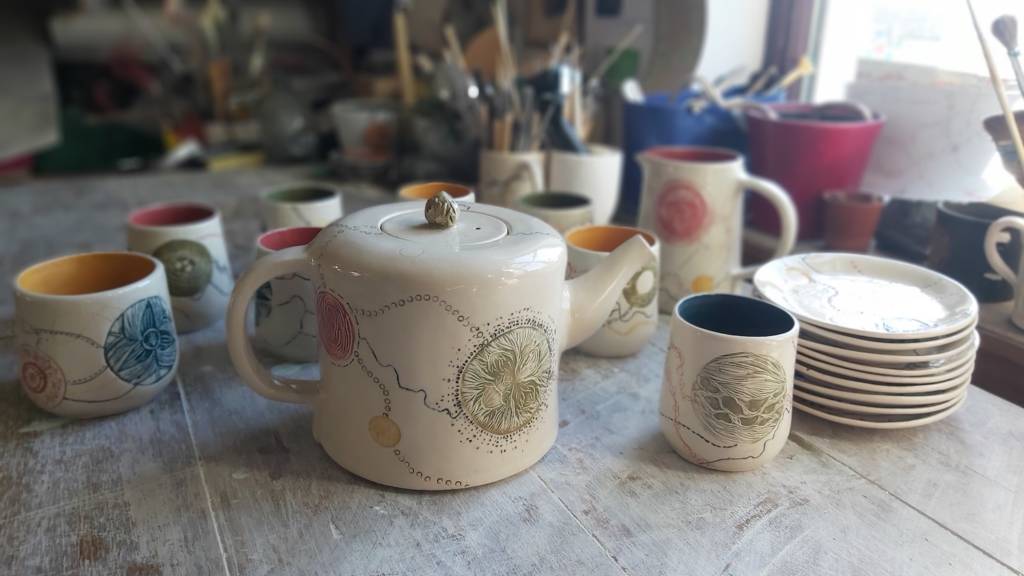
The Entangled Tea Set is a set of ceramic and textile items created by Nicky and the Alyth community. The set consists of:
- Three teapots (in different sizes to accommodate larger and smaller group)
- Eight cups
- Eight plates
- A milk jug
- A sugar bowl
- Eight placemats
- Eight napkins
- A placemat for the teapot
- A table cloth
Using stamps that were designed by people of all ages and carved by young people, the surface of each piece in the set was embellished with their colourful symbols.
Nicky details what each of the stamps on the tea set mean in this visual key. You can click on each to view them more closely, or contact us if you’re interested in receiving the information in an accessible format.
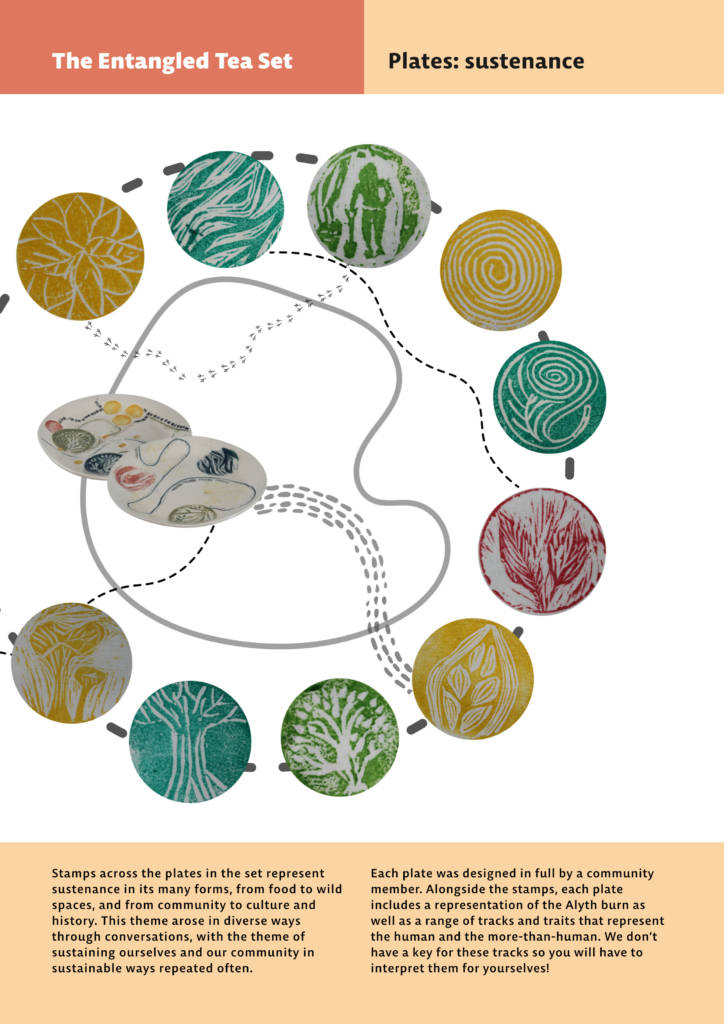
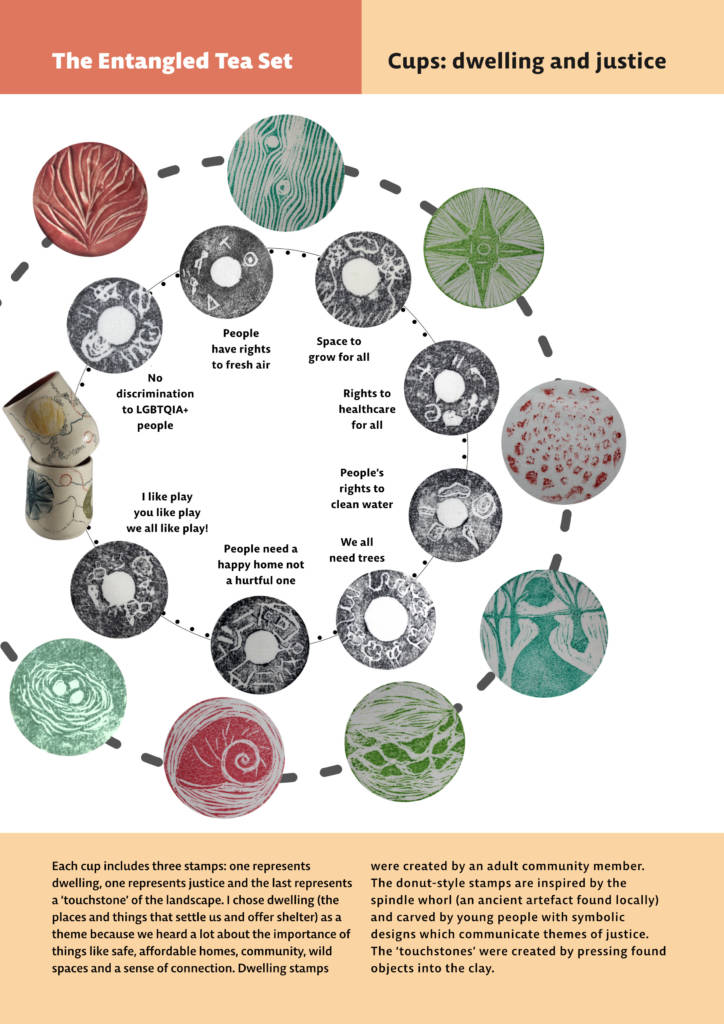
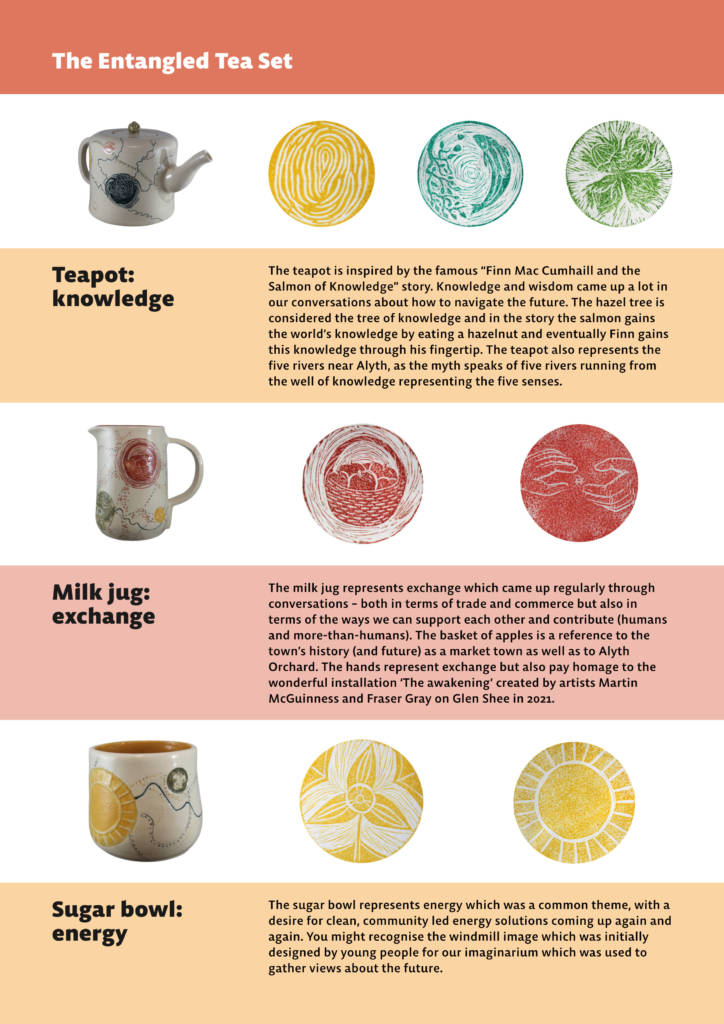
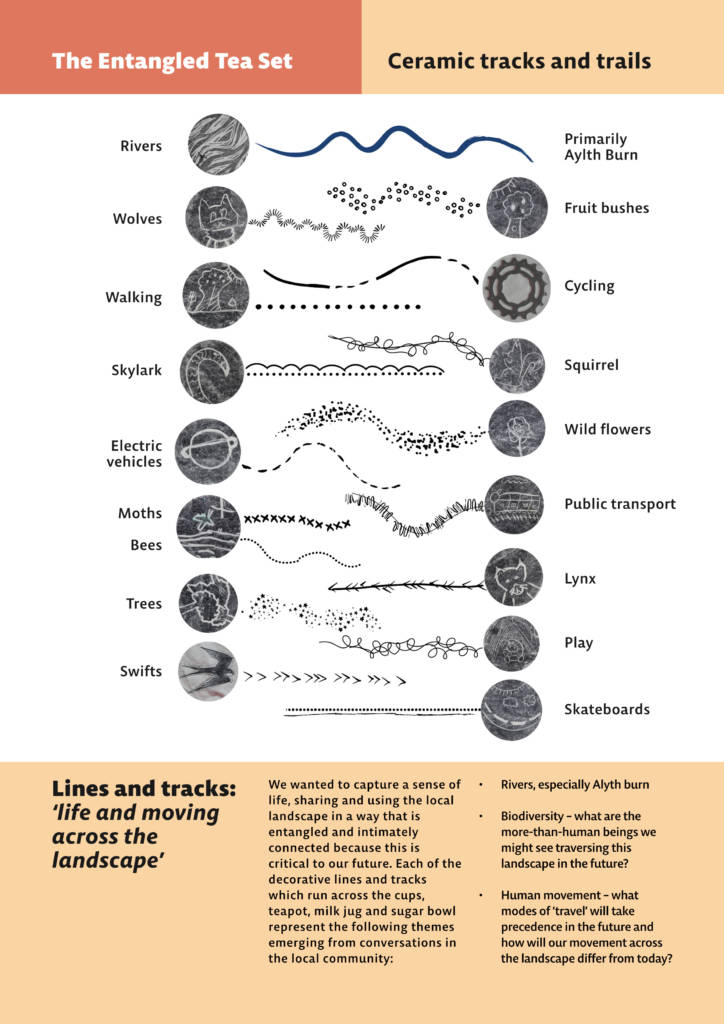
Nicky wrote a blog that details the purpose, future and process of making the Entangled Tea Set. These insights are also available to download in an information pack.
Those who have contributed to the design of the tea set:
- Alyth Youth Partnership
- Thrifty Threadies
- All who attended the ‘Make your Mark’ sessions
- Cornelia and Ciara who helped with delivering the creative workshops
Other groups that have helped in different ways:
- The Scout hall, for letting us use their space for sessions
- Thrifty One, helping with textiles for the project
Led by Creative Dundee over three years, CULTIVATE brings together creative practitioners and community groups across the Tay region to explore climate justice in a practical and meaningful way.
CULTIVATE is part of Culture Collective, a network of 26 participatory arts projects, shaped by local communities alongside artists and creative organisations. Culture Collective is funded by Scottish Government emergency COVID-19 funds through Creative Scotland.
Culture Collective has the potential to place creative practice right at the heart of a just transition and help shape the future of local cultural life, demonstrating the critical impact of community engagement, and the role creativity and culture play within it.

Thank you for visiting
If you would like to support us in creating even better content, please consider joining or supporting our Amps Community.
